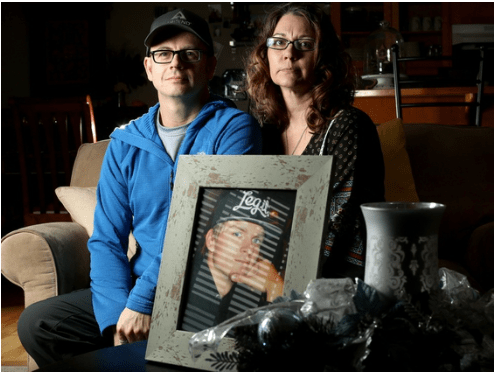“Timid yet goofy, with a dry sense of humour.” That’s how Liam Parkes, a shift supervisor for Suncor, describes his son Tristan as a child. He had a heart of gold too, says his dad, who remembers when Tristan spent his seventh birthday spoils on groceries for the food bank. These are the memories that Liam holds on to tightly, as the following ones are more difficult to bear.
Tristan’s teenage years unraveled in a run of dark turns. After a series of bullying that wasn’t handled well by authority figures, he began to get angry, had problems at school and fell in with a bad crowd. At the age of 15, Tristan stole jewelry from his family’s home to buy cocaine and was placed on a court-mandated detox.
At 17, he moved for a construction job with the potential of an apprenticeship, but he again began to pull away from his family and responsibilities once he got into fentanyl, a highly-addictive opioid. Tristan spent months on the street, stole heirlooms and money from his family, and even pawned his mother’s engagement ring. Still, as loving and committed parents, they paid his $10,000 in drug debt and bailed him out of jail.
Then in September 2015, there was a knock at the door. The police informed Liam’s wife Dana that their son was discovered in the janitor’s closet of an underground parkade, dead from a fentanyl overdose.
Tristan was 19.
“You watch helplessly as your child is slowly taken by a disease and deteriorate as a person,” says Liam. “You always love them, but you lose trust, and hope slowly starts to diminish. And it’s devastating when it ends, when they don’t come out of it.”
Liam’s work crew know his story and that he has an open-door policy encouraging them to come to him with difficulties at work or home. His personal experience helps him to notice behaviours, such as becoming withdrawn from peers and social situations, mood swings, tiredness, anxiety and stress, all of which warrant a private conversation.
“Hopefully our story is heard and those struggling know that they are not alone. We must be brave enough to intervene and help save those suffering in silence.”
Nov 22-28: National Addictions Awareness Week
Throughout National Addictions Awareness Week, it is important to take the time to learn more about prevention, talk about treatment and recovery, and to understand that substance use is a disorder and should be treated as a medical condition. We all have a part to play in breaking the stigma to avoid barriers to accessing treatment and other important services.
With the pandemic contributing to an overall deterioration of health for many over the last eight months, it is more important than ever to look out for each other.
If you believe that you have or are developing a substance-related problem with alcohol or drugs, don’t hesitate to as ask for help. Look for local support for substance abuse in your area. You are not alone.




